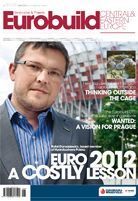Poland is to spend PLN 88 bln on co-hosting Euro 2012. The expenditure earmarked for the stadiums alone amounts to as much as PLN 5 bln. For general contractors it should have been a construction bonanza. But perhaps the experience gained will be more valuable than the financial benefits
Zuzanna Wiak
In a year's time, on June 8th 2012, millions of Europeans will be transfixed in front of their TV sets, while those who have been lucky enough in the ticket lottery will be seated in Warsaw's National Stadium to see the kick off of Euro 2012 - the European football championships. Poland is to be the host of 16 of the 31 scheduled matches. Apart from the opening game in Warsaw, the country will host eleven matches in the group phase, three quarter-finals and one semi-final. Competing teams will meet five times at the Warsaw venue, four times at the PGE Arena in Gdańsk and three times apiece in Wrocław and Poznań. The decision to entrust Poland and Ukraine with the tournament was




























































